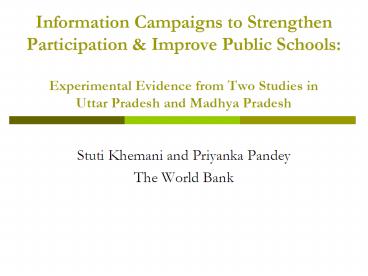Information Campaigns to Strengthen Participation - PowerPoint PPT Presentation
1 / 34
Title:
Information Campaigns to Strengthen Participation
Description:
Receive and decide how to spend government grants ... All Government primary school head-teachers surveyed. All VEC members surveyed ... – PowerPoint PPT presentation
Number of Views:56
Avg rating:3.0/5.0
Title: Information Campaigns to Strengthen Participation
1
Information Campaigns to Strengthen Participation
Improve Public SchoolsExperimental Evidence
from Two Studies in Uttar Pradesh and Madhya
Pradesh
- Stuti Khemani and Priyanka Pandey
- The World Bank
2
Motivation
- Widening belief that encouraging participation
by citizens, or clients of services, can improve
the quality of publicly provided education
services - Education policies across states in India have
created specific institutions for community
participation to improve public schools - Emerging survey evidence that citizens are not
informed about or aware of these institutions - We test (using the gold standard of
randomization) what impact providing information
has on participation in and performance of public
schools
3
Study 1 (with Pratham and J-PAL)
- Jaunpur district in Uttar Pradesh (UP)
4
Institutions of participation in UP
- Village Education Committee (VEC)
- 5 members elected head of village government
(Gram Pradhan), senior head teacher from village
public schools, 3 parents
5
Roles of the VEC
- Monitoring Visit schools and inspect records
- Planning and Implementation
- -- Receive and decide how to spend government
grants - -- Participate in selection of Shiksha Mitras
(contract teachers recruited from within the
community) for government schools if there are
not enough teachers. - -- Build or maintain school rooms
- -- Manage mid-day meals, distribute scholarships
- -- Raise more money for the school
- -- Work with school teachers to improve education
quality - -- Encourage parents to improve child attendance
6
Evidence on Participation Baseline Survey
- Survey took place over March-June 2005
- In each of 280 Villages (randomly selected), we
collected data on - Learning Outcomes
- 30 households randomly selected
- all children between the ages of 7 and 14 are
tested on basic reading, writing, and math
skills - Community Participation and Local Governance
- 10 households (of the above 30) randomly selected
and surveyed - All Government primary school head-teachers
surveyed - All VEC members surveyed
- School Resources and School-Functioning
- All government primary schools surveyed
7
Parents dont know that a VEC exists
8
VEC members dont know their roles
9
(No Transcript)
10
Parents of children at low levels of learning are
particularly unlikely to know this
11
Parents of children at low levels of learning are
particularly unlikely to know this
12
Interventions to Strengthen Community
Participation (1)
- Information about VECs
- Small, informal meetings in each hamlet during 2
days in a village - Village-wide meeting on 2nd or 3rd day, with
participation of key VEC membersGram Pradhan and
School Teacher - Distribution of pamphlets to VEC members listing
and explaining their roles
13
Interventions to Strengthen Community
Participation (2)
- (1) Testing Tool
- In hamlet meetings, facilitators begin testing
children community invited to test children
themselves and prepare hamlet-level report
cards - In village-wide meeting, hamlet volunteers
invited to present testing tools and report
cards - Testing tool provides additional information
(about learning), mobilizes community, and builds
capacity in monitoring
14
Interventions to Strengthen Community
Participation (3)
- (2) Teaching Tool of Read India
- In village-wide meeting, Pratham facilitators
present Read India teaching tool - Offer to train anyone who would like to hold
reading classes - Teaching tool provides additional information
(about how to improve learning), mobilizes
community, (come forward to make your village a
reading village), and builds capacity in teaching
15
Experience with Interventions
- 65 villages each received Interventions 1, 2, and
3 between September and December 2005 - Repeat visits in February to hand-out and explain
pamphlets to VEC members - 85 villages served as controls
- 215 village-wide meetings recorded in 195
treatment villages on average, attendance of
108 villagers/meeting - (Village size average 360 hshlds, min 146, max
1289) - Village Pradhan, and School Head-teacher attended
68.2 and 71.7 of meetings respectively
16
Experience with Interventions
- Read India intervention received large
responselocal youth volunteered to hold regular
classes for 2-3 mths
17
Endline Survey
- Survey took place over March-June 2006
- Impact evaluation using
- -- matched panel of 2500 households
- -- matched panel of 260 govt. schools
- -- matched panel of 16,400 children
- -- VECs matched 240 villages, with responses of
all VEC members collapsed by village
18
Impact Evaluation
- Difference-in-Difference estimates
- With and without controls
- Standard errors clustered by village
19
Interventions did happenimpact on knowledge and
training of VECs
20
No impact on self-reported VEC activity
21
No impact on self-reported VEC activity
- No impact on
- -- self-reported hiring of additional teachers,
- -- distribution of scholarships,
- -- implementation of mid-day meals,
- -- various others
22
No impact on parent-reported participation
23
No impact on head-teacher reported parent
participation
24
No impact on head-teacher reported school
resources
25
No impact on number presence of teachers in
public schools
26
No impact on public school enrollment and
attendance
27
Impact on Learning
28
Closer look at impact on reading
29
Closer look at impact on reading
30
Closer look at impact on reading
31
Improvement over time among illiterate children
32
Improvement over time among children who could
recognize letters
33
Improvement over time among children who could
read words or paragraphs
34
Summary of Impact
- Impact on learning driven by local youth
volunteering to hold reading classes - Children who enrolled in these classes made
significant improvements in reading within a few
months - No discernable impact on activity within public
schools, or by VECs - No anecdotal evidence of VECs, or Pradhans, or
school teachers, supporting these volunteer-led
reading classes - Bottomlineevidence of participation to improve
learning outcomes, but outside public schools































